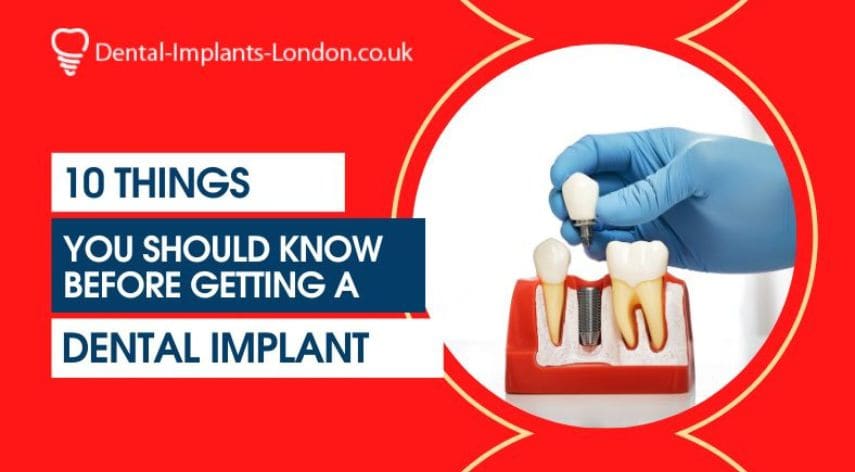10 Things To Know Before Getting Dental Implants

Dental implants are artificial replacements for the root of your teeth. During the surgical installation, the technician will numb your mouth with a local anaesthetic. It takes about 90 minutes to complete the surgery. However, the entire process might take 6 to 12 months on average. This is because you would need multiple dental appointments after the surgery.
You get a natural-looking and natural-feeling dental replacement for a lost tooth that lasts for years to come. Implants can be more expensive than other alternatives and may not be an ideal solution for those who cannot undergo surgery.
Let us look at the benefits of dental implants before you schedule a consultation for dental implants in London.
Table of Contents
ToggleBenefits of Dental Implants
Dental implants are made to be durable and closely mimic the look and feel of a natural tooth. If covered with a crown, one cannot differentiate between a real or a fake one. Dental implants offer many benefits, which include:
Durability
One of the best ways of treating a lost tooth is opting for a titanium dental implant. Dental implants last longer than other alternatives with a success rate of 97% for ten good years.
In a study examining the life span of 10,871 dental implants over 22 years, implant survival rates were:
- 98.9% at 3 years
- 98.5% at 5 years
- 96.8% at 10 years
- 94.0% at 15 years
A 2021 review explored that dentures last an average of 10 years. Dental bridges need a replacement every 5 to 15 years.
Bone loss prevention
Dental implants are known to help prevent teeth bone loss, which happens after losing a tooth. When one loses a tooth, the jawbone is no longer in use in that part of the mouth. With time, the patient’s body wears down and reabsorbs some bone tissue.
According to studies, 30% of the alveolar ridge gets lost after the loss of a tooth. The alveolar ridge is part of the jawbone containing the tooth socket. Most bone loss happens during the first 6 months.
In studies, researchers found that dental implants have a noticeable impact on preventing alveolar ridge by decreasing the rate of bone resorption.
Natural look and feel
Dental implants serve as artificial roots for your teeth. Dentists put a crown on the top of the dental implant that mimics the look and feel of a natural tooth. It also feels more comfortable than alternatives such as dentures.
In a 2016 study, researchers found that about 94% of 400 patients reported satisfaction with the feel and aesthetics of their dental implants.
Keeps adjacent teeth stable
When you are missing a tooth, the surrounding part of your tooth slowly migrates toward the gap. This could cause problems with the bite and your ability to chew food. A dental implant is able to fill the gap between the teeth, keeping up the health of your teeth by keeping them from drifting.
Restores your face’s cosmetic appearance
Jawbone loss after having a tooth loss can reshape one’s face. This may lead to changes including:
- Sagging skin
- Sunken appearance
- Collapsed cheeks
- Bite misalignment
Changes in the face are the most noticeable signs if you are missing a few teeth. In those cases, dental implants can help prevent these facial changes by keeping the structural integrity of the jaw and averting bone loss.
Behaves like natural teeth
A dental implant closely mimics the natural teeth while chewing, as opposed to traditional dentures or dental bridges. It also helps preserve one’s speech patterns by filling the gaps in the teeth that cause changes to the way air passes through the mouth while talking.
Restores bite force
It has been found in a study that implant-supported overdenture of the lower jaw helps to increase biting force as opposed to traditional dentures.
Improves quality of life
In a previous study, there were no implant failures at a 3-year follow-up appointment among 98 patients that got implant-supported over-dentures. It has been proved that an implant-supported over-denture has the potential to improve the quality of life with fewer risks and high rates of survival after implant.
Final thoughts
Dental implants are sturdy dental prostheses, which are able to replace a tooth’s root. They are covered with crowns, dentures, or bridges.
No doubt, they offer long-lasting and natural-looking results. Since they are super effective, it can cost you an arm and a leg to get one. However, it is worth every penny. Consult with your dentist to learn about the options you have at your disposal. This will help you decide if an implant may be an ideal option for you or if you should go after another dental prosthesis.
Recommended For You
Spread the loveSexual health is an essential aspect of personal well-being. If you’re based in London and need STI testing,
Spread the loveIn today’s fast-paced world, managing your health effectively is more important than ever – especially for those of
Spread the loveThe EGFR blood test is an important way to check how well the kidneys are working. It checks




